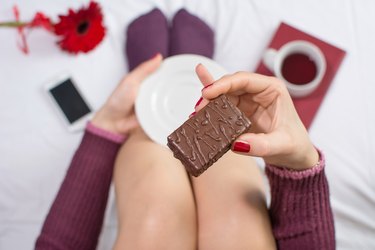
It should come as no great surprise that your menstrual cycle can seriously mess with your mood, hunger and cravings. So those days when you just can't resist fries at lunch or keep your hands off the office candy dish? Yeah, you can thank your fluctuating hormones for that.
It can be frustrating to feel like you're at the mercy of your biology, especially when you're having an "off" day (or two). But if you can recognize what's happening and why, you can tailor your eating approach to best suit your body at every phase of your cycle.
Video of the Day
Video of the Day
That said, every woman's body — and thus, cycle — is different. The guidelines below are based on an average 28-day cycle, which will apply to some women. However, your cycle may be longer or shorter, and you may find your personal dietary needs differ. Let your body be your guide.
How to Eat During Days 1 to 14
Welcome to the follicular phase of your cycle! This phase begins on the first day of your period and ends with ovulation around day 14 or 15 (but, again, that's just an average).
According to Cassandra Forsythe, Ph.D., assistant professor of physical education and human performance at Central Connecticut State University, you'll need fewer calories during this phase of your cycle, due to higher levels of estrogen. And thanks to a drop in hormones, your body will also be better at burning carbs for fuel (hooray).
One common symptom you may experience during this phase — especially at the very beginning of your cycle — is fatigue, thanks to the loss of iron through menstrual blood.
As Lois Chait, RD, owner of Dietitian4u, points out, most American women struggle to get sufficient iron (18 milligrams per day between the ages of 19 and 50) as well as other nutrients that help with iron absorption (like vitamin C) via diet. So she recommends upping your fruit and vegetable intake.
Megan Meyer, Ph.D., director of science communication at the International Food Information Council Foundation, recommends shoring up your iron stores with plant protein sources like beans, lentils and tofu, animal protein sources like beef, chicken and tuna and fortified and whole-grain foods like cereals, pasta and bread.
"Dark chocolate also contains iron," she says. "So all the more reason to enjoy a few squares of dark chocolate during that time of the month!" That's something nearly all of us can get on board with!

How to Eat During Days 15 to 28
The last half of your cycle, also known as the luteal phase, is the time when you need the most calories, says Dr. Forsythe. As such, you'll likely feel increased hunger after ovulation, when estrogen levels dip and progesterone increases.
But just how many more calories do you need during this time? It's tricky to say, since caloric needs vary greatly from person to person, says Liz Sanders, RD, director of research and partnerships at the International Food Information Council Foundation.
However, a 2007 review published in the International Journal of Obesity reports that some women's caloric intake can increase by 90 to 500 calories per day during the luteal phase.
You may also tend to seek out more mood-boosting foods (think high-fat, high-carb foods like doughnuts and french fries) during the luteal phase because your levels of serotonin (a brain chemical that helps regulate mood, sleep and appetite) tend to decline, particularly during the final five to seven days of your cycle, Dr. Forsythe says. In addition, your body begins to burn carbs less effectively than it did during the follicular phase.
How Mindful and Intuitive Eating Can Help
So how can you keep your changing caloric needs and hunger levels from derailing your healthy eating habits? Mindful and intuitive eating tactics can help. Both approaches to your diet can help you avoid binge-eating behaviors, according to a 2017 review of 68 studies published in Nutrition Research Reviews. You'll also avoid feeling deprived or completely depleting your willpower.
According to Sanders, intuitive eating helps you separate actual hunger from other factors — such as stress or fatigue — that may prompt you to eat, while mindful eating can help you enjoy your food more. "[As a result] you'll need less food to feel satisfied," she says.
So before you raid the fridge, stop and tune in to your body. True hunger will get your stomach growling, and you may feel the effects of low blood sugar, such as low energy, trouble concentrating or even lightheadedness. In the absence of physical symptoms, you may just be bored, stressed or fatigued.
To be sure, rank your hunger on a scale of 1 to 10, with 1 being starving and 10 being stuffed. If you're at a 4 or below, fill up with a meal or a snack (and stop eating when you reach a 6 or a 7).
However, if after ranking your hunger you're at a 5 or above, you may just need to drink some water, distract yourself with a book or project or practice techniques to bring your stress levels down.
When you do eat, pay attention. Try to limit distractions (i.e., don't eat in front of the TV or computer) and tune in to the flavors, textures and other sensory aspects of your food. This will help you enjoy your food and keep you from mindlessly going back for seconds or thirds.
What Do YOU Think?
Do you notice that your body craves different foods in different amounts during each phase of your menstrual cycle? How do you keep your eating in line with your health and nutrition goals? Were you surprised that your caloric needs fluctuate with your hormones? Share your thoughts and questions in the comments below!